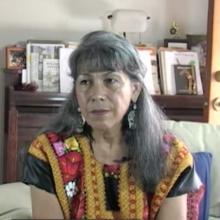
Olivia Puentes Reynolds sits for her interview with a guitar on her knee. Hers is a story of music and mythology, her activism inspired by poetry. Reynolds’ archive of health reports and radical newsletters is peppered with songs and drawings, complete with an entire teatro frontera booklet. Throughout her life, Reynolds combined art, music, and writing to stand up for social change.
Olivia Puentes Reynolds was born to a mixed-race family – her mother Chicana, her father Irish, English, and Cherokee. While she speaks about loving her mixed-race heritage, Reynolds says she always identified as Chicana, even though she grew up speaking English as her first language. Reynolds did not have an easy childhood; she mentions experiencing domestic abuse, as well as discrimination for being a person of color. She found comfort in music, learning to play guitar at the age of 18 and continuing to play music for the rest of her life.
Reynolds started her journey with higher education at Mesa Community College. She discusses struggling at community college because she was surrounded by wealthy, white students with whom she struggled to identify. At community college, Reynolds became involved with Mexican-American student organizations. She then transferred, through the Equal Opportunities Program, to San Diego State. Reynolds is honest about her struggle with identity while at college. She discusses how she didn’t want to identify as “Mexican,” even though she found Mexican-American student organizations to be a great source of support. To her, “Mexican” was a dirty word. She had to confront her own internalized oppression and feeling ugly to come into self-love and believing that brown is beautiful.
While at college, Reynolds began noticing oppression based on both her race and gender. She describes her “click” moment of realizing gender inequality as being in a Chicano student meeting. She voiced an idea, and no one took it seriously; when a male colleague repeated the same idea, everyone responded well. Reynolds describes the frustration surrounding these types of encounters, though she also notes how “dangerous” it was to call oneself a feminist; not only did people take you less seriously, she says, but also men weren’t attracted to feminists. Reynolds doesn’t seem to mind these negative connotations; she says she is “done with Chicano men forever” because of their macho attitudes.
A pinnacle moment for Olivia Puentes Reynolds’ activism was when she read her poem, “I heard black is beautiful,” aloud at the Denver youth conference in 1969. Reynolds was 19 years old, very pregnant, and desperately nervous, but she got onstage and read her poem because, as she says, she was used to the unfair treatment of women and wanted to stand up for women as contributors to the Chicano movement. The poem is about wanting to feel beautiful as a brown woman in a world where attention is most often given to white voices. She received a standing ovation from the audience.
Reynolds continues to be active in advocating for women’s rights. Her work now is focused on sexual assault and rape.
